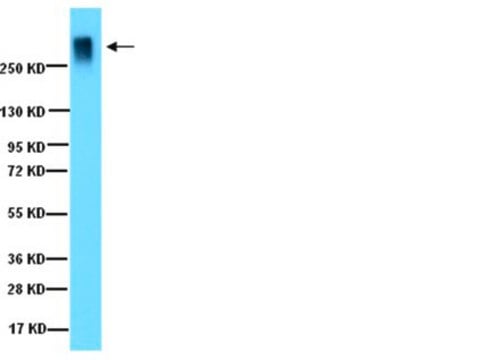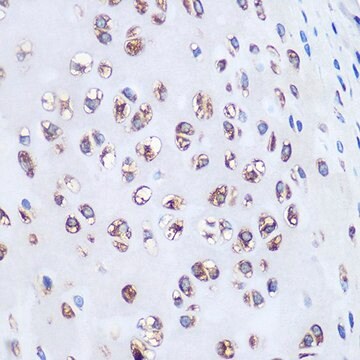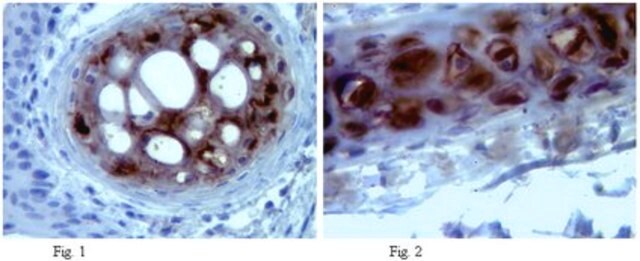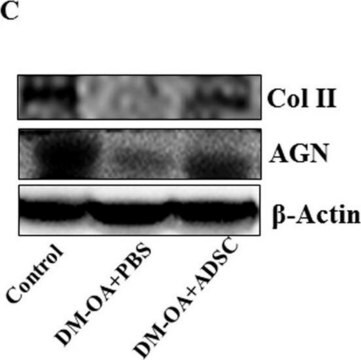MAB19310-C
Anti-Aggrecan Antibody, MMP Cleaved, clone AF-28, Ascites Free
clone AF-28, from mouse
Synonyme(s) :
Aggrecan core protein, MMP-cleaved, Cartilage-specific proteoglycan core protein, MMP-cleaved, Chondroitin sulfate proteoglycan 1, MMP-cleaved, Chondroitin sulfate proteoglycan core protein 1, MMP-cleaved, CSPCP, MMP-cleaved
About This Item
Produits recommandés
Source biologique
mouse
Niveau de qualité
Forme d'anticorps
purified immunoglobulin
Type de produit anticorps
primary antibodies
Clone
AF-28, monoclonal
Espèces réactives
bovine, porcine, human, rat, mouse
Technique(s)
immunohistochemistry: suitable (paraffin)
western blot: suitable
Isotype
IgG1κ
Numéro d'accès NCBI
Numéro d'accès UniProt
Conditions d'expédition
wet ice
Modification post-traductionnelle de la cible
unmodified
Informations sur le gène
human ... ACAN(176)
Description générale
Spécificité
Immunogène
Application
Immunohistochemistry Analysis: A representative lot detected MMP-cleaved aggrecan in paraffin-embedded tibia sections from both wild-type mice and mice with decreased MMP-13 expression (Zhou, X., et al. (2010). Proc. Natl. Acad. Sci. U. S. A. 107(29):12919-12924).
Western Blotting Analysis: A representative lot detected a higher level of MMP-generated FFGV fragments in osteoarthritis/osteoarthritic (OA) cartilage than in normal cartilage samples (Struglics, A., and Hansson, M. (2012). Biochem. J. 446(2):213-223).
Western Blotting Analysis: A representative lot detected MMPs-digested G2 fragment from recombinant G1-G2, but not undigested, elastase- or trypsin-digested fragments (Mercuri, F.A., et al. (1999). J. Biol. Chem. 274(45):32387-32395).
Western Blotting Analysis: A representative lot detected MMP-13-digested fragments from human, pig, bovine and rat, but not shark, aggrecan. Clone AF-28 did not detect undegraded aggrecan (Fosang, A.J., et al. (1996). FEBS Lett. 380(1-2):17-20).
Western Blotting Analysis: A representative lot detected in vitro generated aggrecan fragments by MMPs, as well as various aggrecan fragments in arthritis patients-derived synovial fluids (Fosang, A.J., et al. (1995). Biochem. J. 310( Pt 1):337-343).
Cell Structure
ECM Proteins
Qualité
Western Blotting Analysis: 0.5 µg/mL of this antibody detected MMP-cleaved aggrecan in 10 µg of human chondrocyte tissue lysate.
Description de la cible
Forme physique
Stockage et stabilité
Autres remarques
Clause de non-responsabilité
Vous ne trouvez pas le bon produit ?
Essayez notre Outil de sélection de produits.
En option
Code de la classe de stockage
12 - Non Combustible Liquids
Classe de danger pour l'eau (WGK)
WGK 1
Certificats d'analyse (COA)
Recherchez un Certificats d'analyse (COA) en saisissant le numéro de lot du produit. Les numéros de lot figurent sur l'étiquette du produit après les mots "Lot" ou "Batch".
Déjà en possession de ce produit ?
Retrouvez la documentation relative aux produits que vous avez récemment achetés dans la Bibliothèque de documents.
Notre équipe de scientifiques dispose d'une expérience dans tous les secteurs de la recherche, notamment en sciences de la vie, science des matériaux, synthèse chimique, chromatographie, analyse et dans de nombreux autres domaines..
Contacter notre Service technique






